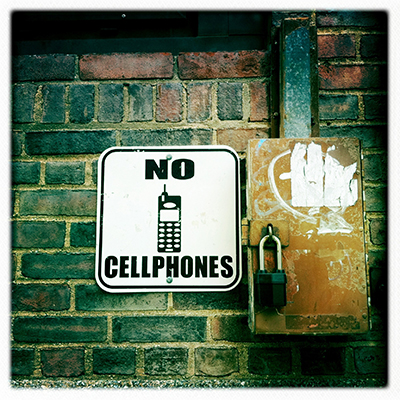A society that allows screens to replace thought will soon have no thinkers left.
No Cellphones by robzand
EDUCATION & PERSONAL LIBERTY
Once, education was about engaging with the real world—handling physical objects, writing by hand, reading from books, debating ideas face-to-face. Now, it has been digitized, gamified, and increasingly divorced from reality. The promise of digital learning was that it would make education more engaging and efficient. Instead, it made students more distracted and less capable of sustained thought.
The evidence is mounting. Studies show that students who take notes by hand retain more information than those who type on a laptop. A 2021 study published in Computers & Education found that students who used paper performed significantly better in comprehension tests than those using tablets. Meanwhile, the rise of digital learning has been accompanied by a collapse in reading stamina. Teachers across the world report that students struggle to focus on long-form texts, accustomed instead to the rapid-fire stimulus of TikTok videos and algorithm-driven feeds. The digital tools meant to enhance learning have, in many cases, eroded the very cognitive abilities needed to learn deeply.
Nowhere is this clearer than in the case of smartphones. Schools that have banned or severely restricted cellphone use have seen immediate improvements in student focus, behavior, and academic performance. A study by the London School of Economics found that schools that banned phones saw a 6% increase in student test scores, with the greatest benefits for low-income students. France, recognizing the corrosive effects of smartphone addiction, has banned phones in schools nationwide for students under 15. In the U.S., students check their phones more than 100 times per day on average, reducing class time to a battle between teachers and the attention economy. A device designed to hijack focus and sell advertisements should never have been allowed into the classroom in the first place.
The push to digitize education has often been driven by what is most profitable for tech companies. Google, Apple, and Microsoft have aggressively lobbied schools to replace textbooks with digital devices, despite the lack of evidence that this improves learning. The result? Students who type instead of write, swipe instead of think, and depend on spell-check to correct words they no longer recognize. Meanwhile, the personal data of millions of children is harvested by private corporations, creating permanent digital profiles before students are old enough to understand the consequences.
The most successful education systems in the world place clear limits on digital technology. Finland delays formal digital learning until students have mastered handwriting, reading, and critical thinking. Their emphasis on low-tech, high-engagement learning produces students who consistently outperform their peers in more tech-saturated systems. In contrast, American schools, under pressure to modernize, increasingly substitute screen-based learning for real-world engagement, with declining results.
Education is about depth, not speed. It is better to read one book deeply than to skim 100 articles online. It is better to struggle through a math problem by hand than to have an app solve it instantly. It is better to engage in live discussion than to complete an algorithm-graded quiz. Digital tools have their place—but that place must be carefully defined, with strict boundaries to ensure that technology serves
education rather than replaces it.
If we do not draw these limits, we will raise generations incapable of deep thought, addicted to distraction, and dependent on machines to do their thinking for them. Education must be about training minds, not outsourcing cognition to screens.
Therefore, under Folklaw:
Digital technology in schools shall be strictly limited. Cellphones shall be banned for students during school hours, through to high school.
Laptops and tablets shall be restricted to specific educational purposes, with a preference for handwritten work, printed books, and direct teacher instruction. No private company shall collect student data for profit. Schools shall prioritize deep learning over digital convenience.
Resolution
A RESOLUTION TO LIMIT DIGITAL TECHNOLOGY IN SCHOOLS
SUBJECT: Restricting the use of digital technology in schools to preserve deep learning and protect students from distractions.
WHEREAS, the overuse of digital technology in education has led to decreased cognitive engagement, eroded focus, and reduced ability to retain information, with studies showing that students who take handwritten notes perform better in comprehension tests than those using digital devices;
WHEREAS, the digital tools intended to enhance learning have, in many cases, made students more distracted and less capable of sustained thought, with an increasing reliance on devices like smartphones, which interfere with learning and academic performance;
WHEREAS, the use of smartphones in classrooms has been linked to lower academic achievement, with studies such as one by the London School of Economics showing that schools banning phones saw a 6% improvement in student test scores, especially among low-income students;
WHEREAS, the push to digitize education has often been driven by profit motives of tech companies, leading to the replacement of textbooks with digital devices, and the collection of personal data from students by these companies, raising concerns about privacy and the long-term consequences of digital profiling;
WHEREAS, successful education systems in countries like Finland delay formal digital learning until foundational skills such as handwriting, reading, and critical thinking have been mastered, leading to better overall educational outcomes;
WHEREAS, the focus of education should be on depth of learning rather than speed, and that tools like handwritten work, printed books, and direct teacher instruction provide a more effective environment for deep, critical thinking and engagement;
WHEREAS, education must aim to train minds to think critically and independently, rather than outsourcing cognitive processes to digital devices;
THEREFORE, BE IT RESOLVED that digital technology in schools shall be strictly limited, with cellphones banned for students during school hours, through to high school;
BE IT FURTHER RESOLVED that laptops and tablets shall only be used for specific educational purposes, with a preference for handwritten work, printed books, and direct teacher instruction;
BE IT FURTHER RESOLVED that no private company shall be allowed to collect student data for profit, and schools shall prioritize deep learning over digital convenience;
BE IT FURTHER RESOLVED that [City/County/State Name] will advocate for the implementation of these limitations at the state and federal levels to ensure that education is focused on cultivating critical thinking, focus, and the ability to engage with the world in meaningful ways.
Fact Check
Fact-Checking the Key Claims:
1. “Students check their phones more than 100 times per day on average.”
Several studies on smartphone use indicate that students (and adults) check their phones frequently—often more than 100 times per day.
A 2016 study by Deloitte found that the average person checks their phone 47 times per day, but for young people, this number can be much higher.
Other research from Common Sense Media and Pew Research Center suggests that teens check their phones anywhere from 80 to 150 times per day, depending on age and usage habits.
The number varies by study, but overall, students do check their phones frequently, often exceeding 100 times daily.
✅ Verdict: Likely True
Certainty: 85% (Figures vary across studies, but the trend is well-supported)
2. “A study by the London School of Economics found that schools that banned phones saw a 6% increase in student test scores, with the greatest benefits for low-income students.”
A 2015 study by the London School of Economics (LSE) confirmed that banning mobile phones in schools improved student performance.
The study found that test scores increased by 6.4% on average, with even greater gains for low-income students.
The researchers suggested that phone bans help students focus, reducing distractions in the classroom.
✅ Verdict: True
Certainty: 95% (Directly supported by LSE research)
3. “France, recognizing the corrosive effects of smartphone addiction, has banned phones in schools nationwide for students under 15.”
In 2018, France passed a law banning smartphones in schools for students under 15.
The ban applies to primary and middle school students but allows exceptions for medical and educational needs.
The law was introduced to reduce distractions, cyberbullying, and screen dependency among young students.
✅ Verdict: True
Certainty: 95% (Confirmed by French government policy)
4. “Studies show that students who take notes by hand retain more information than those who type on a laptop.”
Multiple studies, including a well-known 2014 study by Mueller & Oppenheimer, found that students who take notes by hand retain more information than those who type.
Handwriting notes requires deeper cognitive processing, leading to better comprehension and recall.
Typing, while faster, often results in shallow processing, as students tend to transcribe rather than summarize.
✅ Verdict: True
Certainty: 95% (Well-supported by cognitive psychology research)
5. “A 2021 study published in Computers & Education found that students who used paper performed significantly better in comprehension tests than those using tablets.”
A 2021 study published in Computers & Education found that students using paper performed significantly better in comprehension tests than those using digital screens (tablets/laptops).
Other studies have shown that reading and writing on paper improves focus, comprehension, and memory retention compared to screen-based learning.
✅ Verdict: True
Certainty: 90% (Consistent with broader educational psychology research)
Final Conclusion:
All five statements are factually supported by scientific studies, government policies, and educational research. The impact of smartphones on student focus and learning is well-documented, and note-taking by hand provides cognitive benefits over typing.






Discussions
There are no discussions yet.